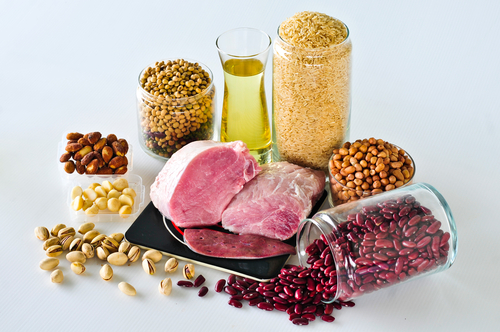
Photo: Shutterstock
Thiamin is an essential and a crucial nutrient that the cells of your body need to develop and function properly. It also goes by the name vitamin B1 or “anti-stress” vitamin and is essential for fueling your body and turning the food you eat into usable energy.
Foods containing Thiamin
Thiamin is found naturally in many foods including whole grains, meat and fish, and legumes such as soybeans, nuts and seeds. Pork has the highest amounts of thiamin of all the meats. Besides this, foods that are fortified with thiamin include fortified bread, rice, cereal and pasta.
A thiamin deficiency, while not common, can occur, and is more likely if a person suffers from alcohol dependence, diabetes and HIV or AIDS. It is also more likely to affect people who are elderly and those who have had bariatric surgery.
Benefits of thiamin
- B1 is a key component in the production of energy from dietary carbohydrates and fats. It functions along with other B vitamins to allow the body to metabolize carbohydrates, fat, and protein, and turn them into energy which can be used by the body. It is essential for the brain and nervous system to function optimally, as well as for healthy skin, hair, eyes, and liver.
- Thiamin is also used for digestive problems including poor appetite, ulcerative colitis, and ongoing diarrhea. It also helps to control the production of hydrochloric acid, which is vital for maintaining proper digestive function.
- Vitamin B1 acts as an antioxidant and guards the body against the degenerative effects of free radicals.
- Early studies have shown that thiamine supplements can lower the risk of developing cataracts.
- Thiamin is an integral vitamin for increasing focus, energy, fighting chronic stress, and possibly preventing memory loss including Alzheimer’s disease. Thiamine can be helpful in maintaining a positive mental attitude and boosting learning abilities, which is why B vitamins are often called the “anti-stress” vitamins.
Effects of a thiamin deficiency
People who don’t get enough thiamin from their diet or who can’t absorb it properly can suffer from memory loss, confusion, a loss of appetite, muscle weakness, a loss of weight and heart problems. A more severe thiamin deficiency is characterized by numbness and tingling in the hands and feet, loss of memory and poor reflexes.
Other conditions affected by a thiamin deficiency include diabetes, heart conditions and Alzheimer’s disease. People with diabetes have been found to have low levels of thiamin in their blood. Those suffering from heart problems also have low thiamin levels and a thiamin deficiency is associated with Alzheimer’s. Although these occurrences are not well understood, research is underway to find out more.
Does it interact with medication?
Thiamin doesn’t interact with many types of medication, and in general, you should only be concerned if you’re taking thiamin supplements. Consult with your health professional if you take any medications. However, furosemide, a medication used to treat high blood pressure and swelling, as well as fluorouracil, used in chemotherapy treatments, can reduce the amount of thiamin in the body.
Please like FamiLife’s page on Facebook so that you get all our articles and others may find us.
